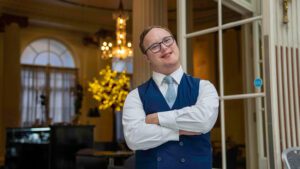People with Down’s syndrome and other learning disabilities say the lack of visible role models in the workplace is one of the biggest barriers to finding employment, according to a new survey that highlights the urgent need for greater inclusion in customer-facing roles.
While there are around 1.3 million people with learning disabilities in the UK, only 5 per cent are employed, a figure that has remained stubbornly low for years. But new research suggests that seeing others with similar conditions thriving in the workplace would significantly boost confidence and encourage more applications.
The poll, conducted by Savanta for the Hilton hotel group, found that three-quarters of respondents with learning disabilities would feel more confident applying for jobs if they saw people like themselves in hospitality roles. Yet just 16 per cent of those already in work said they had someone they could look up to with a similar disability in their workplace.
“When people with learning disabilities see others like themselves thriving in customer-facing roles, it inspires confidence and ambition,” said Mark Costello, principal at Aurora Foxes, a hospitality college for young people with learning disabilities.
The survey also polled 2,000 members of the general public, with over 90 per cent saying it was important to see people from diverse backgrounds — including those with learning disabilities — in visible frontline roles. Three-quarters of consumers felt that not enough people with learning disabilities were represented in the hospitality sector.
The research highlights both the lack of representation and the potential benefits of greater inclusion. Only one in four carers said they had ever been served by someone with a learning disability — a telling sign of how rarely these individuals appear in customer-facing positions.
For those who do manage to find meaningful work, the impact can be transformative.
“Having a job helps people with learning disabilities feel valued and shows others what we can achieve when given the chance,” said Sam Innes, a food and beverage assistant with Down’s syndrome at The Waldorf Hilton in London.
“It’s boosted my confidence and helped me become more independent.”
Stephen Cassidy, senior vice-president of Hilton UK & Ireland, said the company’s goal was to foster a culture where everyone — regardless of ability — could thrive.
“Representation matters — seeing people like yourself succeed at work builds confidence and opens doors to opportunity,” he said.
“By providing the right support and fostering an inclusive environment, we empower individuals to reach their full potential and show that inclusion is a powerful driver of success in hospitality.”
Hilton says team members with learning disabilities now contribute in a wide variety of roles, including front-of-house positions like reception and concierge, as well as behind-the-scenes departments such as kitchens, housekeeping, and revenue management.
As awareness grows, advocates are calling on more employers to follow suit by investing in inclusive hiring practices, providing workplace support, and creating environments where people with learning disabilities are not only welcomed, but actively represented.
The message from jobseekers like Sam is clear: “We want to work. We just need to see that it’s possible.”
Read more:
Lack of role models holding back jobseekers with Down’s syndrome, study finds

